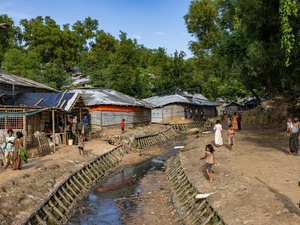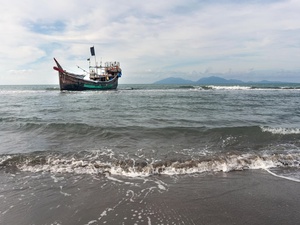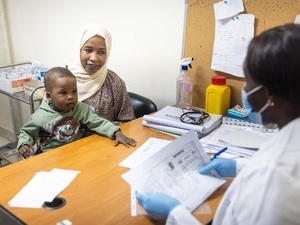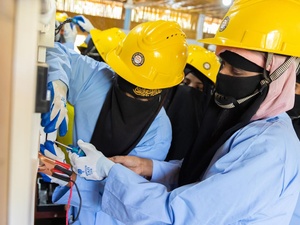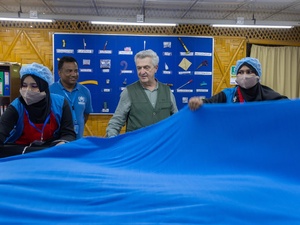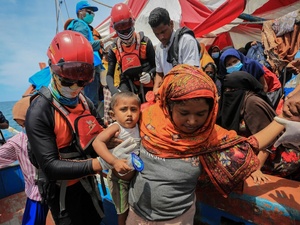Statement on UNHCR’s protection response in Bangladesh
Statement on UNHCR’s protection response in Bangladesh
The following is UNHCR’s response to media enquiries regarding UNHCR’s protection response for Rohingya refugees.
UNHCR, the UN Refugee Agency, is aware of and deeply concerned by the allegations made in a recent BBC documentary. UNHCR remains committed to the protection of close to one million Rohingya refugees who face very difficult conditions in the 33 camps in Cox’s Bazar District, including overcrowding, lack of clear prospects for solutions and worsening security.
UNHCR is alarmed by the continuing deterioration of security conditions in the camps. Between January and September this year, we have recorded over 1,400 serious protection incidents, including killings, torture, abductions, and sexual and gender-based violence by members of criminal gangs.
This difficult security situation has huge consequences for the refugee community as well as our ability to respond to protection concerns raised by refugees. UNHCR does not have the mandate nor the expertise to handle situations of gang violence and recognizes the sovereign prerogative of the Bangladeshi authorities in managing the situation.
UNHCR supports the Government’s efforts to make the camps safer and, together with 49 national and international partners, provides protection services wherever possible — including legal assistance, medical and counselling services for refugees. We also work closely with refugee community leaders, elders and youth, helping them connect with camp officials and law enforcement agencies to address security issues.
The protection and other needs are immense and continue to increase while our resources keep declining. UNHCR’s overall budget in Bangladesh is 55 per cent funded. This means that we are only able to have 19 protection Focal Point staff to cover 33 camps hosting 930,000 refugees in Cox’s Bazar.
We note with concern and deplore the alleged inappropriate comments about Rohingyas and the late Mohib Ullah which have been attributed to some members of our personnel. They are unacceptable and in no way reflect our values and principles. We encourage anyone with relevant information to contact our senior management and/or the Inspector General’s Office to report any type of misconduct so appropriate action can be taken.
Mohib Ullah was deeply respected, and his death was an incalculable loss for the Rohingya community. He was a well-known figure who was met by UNHCR teams in Cox’s, Dhaka as well as at our Headquarters in Geneva. UNHCR publicly condemned his killing in the strongest possible terms.
Before his assassination, our teams were in regular contact with him and the Bangladeshi authorities to discuss the threats he was facing and to find solutions. The authorities allowed him to stay outside the camps and supported him with accommodation. He wanted to continue serving his community in the camps where he was ultimately killed.
After this shocking killing, UNHCR — with the approval of the Government of Bangladesh — began using a secure area located outside the camp (originally established to temporarily house newly arrived refugees) to temporarily accommodate those exposed to severe protection risks. Lighting and security measures were installed in this secure area, and a 24/7 presence of Bangladesh Armed Police Battalion (APBn) was established.
As the security situation worsens, the number and frequency of requests for protection keep rising as well as refugees’ desire and need for resettlement to third countries. When these concerns are raised, we assess the claims and individual needs. However, the solutions we can offer are limited and require authorization from concerned authorities. Each relocation, for instance, requires authorization from the camp authorities, which can take time.
In addition to relocation to safer locations within or outside the camps, UNHCR continuously advocates for emergency procedures to take highly vulnerable refugees outside the country. Resettlement however, depends on quotas provided voluntarily by States and remains extremely limited, which is understandably frustrating for refugees in need. Criteria for resettlement are established by receiving countries, which can make it challenging to find solutions for certain categories of individuals.
We are taking steps to review our protection response and find ways, together with partners, to better address existing gaps with the resources currently available.
While we cannot — for protection and confidentiality reasons — share detailed information on the individuals mentioned in the documentary, we confirm that they are well known to us. These are complex situations which have been assessed by several team members. In some cases, we understand that resettlement is their preferred option, but given its limited availability, we urge the concerned individuals to consider available solutions, including relocation to safer locations when authorized, or access to local services and support.
UNHCR will continue to work with the Government of Bangladesh, humanitarian partners and the international community to ensure the protection of Rohingya refugees and seek durable solutions.
END




